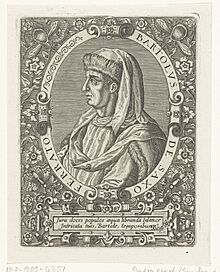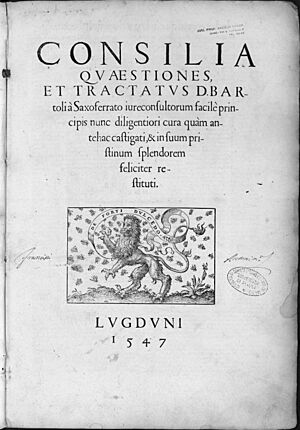Bartolus de Saxoferrato facts for kids
Quick facts for kids
Bartolus de Saxoferrato
|
|
|---|---|
| Bartolo de Sassoferrato | |
 |
|
| Born | 1313 Venatura, Marche, Italy
|
| Died | 13 July 1357 Perugia, Italy
|
| Nationality | Italian |
| Alma mater | University of Perugia University of Bologna |
| Occupation | Law professor |
Bartolus de Saxoferrato (Italian: Bartolo da Sassoferrato; 1313–13 July 1357) was a very important Italian law professor. He was one of the most famous legal experts in Europe during the Middle Ages. People admired him so much that they had a saying: "No one is a good lawyer unless they follow Bartolus."
Contents
Life and Studies
Bartolus was born in 1313 in a small village called Venatura. This village was near Sassoferrato in Italy. His father was Franciscus Severi.
His Education
Bartolus studied law at the University of Perugia. One of his teachers was Cinus. He also studied at the University of Bologna. In 1334, he earned his degree as a doctor of law. This meant he was a highly trained legal expert.
Teaching and Fame
In 1339, Bartolus started teaching law. He taught first in Pisa and then in Perugia. He made the law school in Perugia very famous. It became as respected as the one in Bologna. Because of his work, the city of Perugia made him an honorary citizen in 1348.
In 1355, the Emperor Charles IV chose Bartolus to be his special advisor. Many students came to learn from him. Famous students included Baldus de Ubaldis and his brothers. Bartolus died in Perugia when he was only 43 years old. He was buried in the church of San Francisco.
His Important Works
Even though he lived a short life, Bartolus wrote many important books and papers. He wrote comments on all parts of the Corpus Juris Civilis. This was a huge collection of ancient Roman laws.
Books and Legal Advice
Bartolus also wrote many special books on different topics. One of his most famous books was about laws related to rivers. It was called De fluminibus seu Tyberiadis. He also wrote almost 400 legal opinions. These were like legal advice he gave to judges or people who asked for help.
New Legal Ideas
Bartolus came up with many new legal ideas. These ideas became very important in law for centuries.
Conflict of Laws
One of his biggest contributions was in the area of "conflict of laws." This was very important in 14th-century Italy. Back then, every city-state had its own rules and customs. Bartolus helped figure out how to deal with legal problems when different cities had different laws.
Government and Trademarks
He also wrote about how governments should work. This is called constitutional law. In one of his books, De insigniis et armis, he talked about the rules for heraldry (family symbols). He also discussed early ideas about trademark law. This is about protecting names or symbols used by businesses.
Political Ideas
Bartolus also wrote about political topics. He discussed how local governments should be run. He also wrote about political disagreements and leaders. His ideas tried to balance respect for the Holy Roman Empire with supporting local Italian governments.
International Law
Many people believe Bartolus was the first person to think about international law. This is about rules between different countries or states. He and his student Baldus created rules for how the independent city-states of northern Italy should interact. These rules helped them stay independent but also work together under the Empire.
His Lasting Impact
Bartolus was famous during his lifetime. After he died, he was seen as the greatest legal expert after the rebirth of Roman law.
Influence on Law
His fame was so great that laws in Spain (1427/1433) and Portugal (1446) said that his opinions should be followed. This was especially true if the original Roman laws or other legal comments were unclear. Even in England, where his type of law was not used, Bartolus was highly respected. He influenced later legal writers like Alberico Gentili.
In Popular Culture
Because Bartolus was so famous, his name was used for a lawyer character in many Italian plays. For example, the character Dr. Bartolo appears in Pierre Beaumarchais' play The Barber of Seville (play). This play was later turned into famous operas by Gioachino Rossini (The Barber of Seville) and Mozart (The Marriage of Figaro).
Works
See also
 In Spanish: Bártolo de Sassoferrato para niños
In Spanish: Bártolo de Sassoferrato para niños
 | Lonnie Johnson |
 | Granville Woods |
 | Lewis Howard Latimer |
 | James West |





